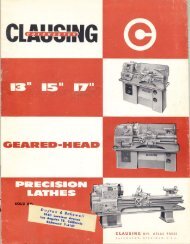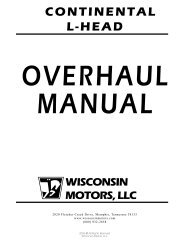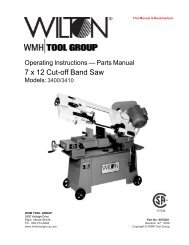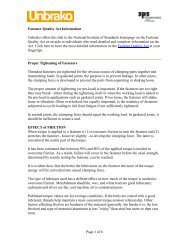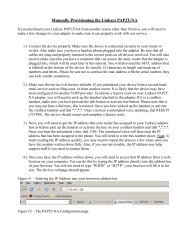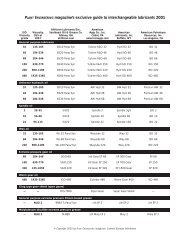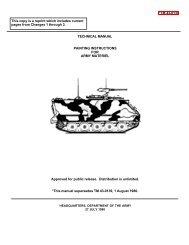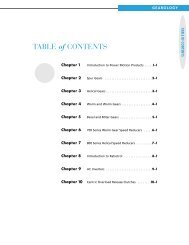This Rigger's Handbook is dedicated to Theodore C - Igor Chudov
This Rigger's Handbook is dedicated to Theodore C - Igor Chudov
This Rigger's Handbook is dedicated to Theodore C - Igor Chudov
You also want an ePaper? Increase the reach of your titles
YUMPU automatically turns print PDFs into web optimized ePapers that Google loves.
Wire Ropes<br />
COMMON WIRE ROPE ABUSES<br />
Neglect and abuse are the two chief enemies of<br />
wire rope life. One costly form of neglect <strong>is</strong> lack of<br />
proper field lubrication. Abuse takes many forms:<br />
improper reeling or unreeling, wrong size or worn<br />
sheaves, improper s<strong>to</strong>rage, and bad splicing are a<br />
few.<br />
CONDITION OF MACHINERY<br />
Wire rope performance depends upon the<br />
condition of the equipment on which it operates;<br />
poorly maintained equipment will usually result in<br />
reduced rope life.<br />
EFFECTS OF SHOCK-LOADING AND<br />
VIBRATION<br />
The destructive effects of jerking or shock-loading<br />
are v<strong>is</strong>ually noticeable. Vibration has somewhat<br />
the same effect, and <strong>is</strong> equally destructive. An<br />
individual shock may be slight, but many rapidly<br />
repeated slight shocks can have the effect of<br />
several large shocks.<br />
Vibration which occurs directly above a load <strong>is</strong><br />
often unavoidable. "Whipping" of the section of<br />
rope immediately above the load <strong>is</strong> also common.<br />
In these cases, rapid wire fatigue <strong>is</strong> possible. For<br />
reasons of safety, th<strong>is</strong> section should be examined<br />
regularly.<br />
Wire rope failure <strong>is</strong> usually cumulative. Each<br />
repeated overstress brings the rope nearer <strong>to</strong><br />
failure. Thus, a wire rope may become fatigued <strong>to</strong><br />
a point close <strong>to</strong> failure under a heavy load, and<br />
actually fail under a much lighter load.<br />
OVERSTRESSING<br />
In any ho<strong>is</strong>ting operation, there should be no slack<br />
in the wire rope when the load <strong>is</strong> applied.<br />
Otherw<strong>is</strong>e, the resulting stress will be excessive.<br />
Overstressing can also be the result of <strong>to</strong>o-rapid<br />
acceleration or deceleration. Wire rope will<br />
withstand considerable stress if the load <strong>is</strong> applied<br />
slowly. As with ordinary twine, a quick snap will<br />
cause overstressing and breakage. <strong>Th<strong>is</strong></strong> applies<br />
both when starting <strong>to</strong> lift a load, and when bringing<br />
it <strong>to</strong> a s<strong>to</strong>p.<br />
CORROSION<br />
Corrosion can seriously shorten wire rope life, both<br />
by metal loss and by formation of corrosion pits in<br />
the wires. These pits act as stress-concentration<br />
points in the wires in much the same manner as do<br />
nicks.<br />
CRUSHING. Because of loose winding on drum, rope was pulled<br />
inbetween underlying wraps and crushed out of shape.<br />
TOO SUDDEN LOAD RELEASE. The sudden release of a load<br />
caused birdcaging. Here individual strands open away from each<br />
other, d<strong>is</strong>placing the core.<br />
LACK OF LUBRICATION. Premature breakage of wires resulted from<br />
"locking" of strands, which was caused by insufficient lubrication.<br />
INFREQUENT INSPECTION. Neglect of periodical inspection left th<strong>is</strong><br />
rope in service <strong>to</strong>o long, resulting in considerable abrasion.<br />
IMPROPER HANDLING. Kink or "dog leg" was caused by improper<br />
handling and/or installation. A kink causes excessive localized or spot<br />
abrasion.<br />
HEADQUARTERS: 55 James E. Casey Drive • Buffalo, NY 14206 PHONE: 716.826.2636 FAX: 716.826.4412 www.hanessupply.com<br />
128<br />
YOUR SLING AND RIGGING SPECIALIST<br />
continued...




